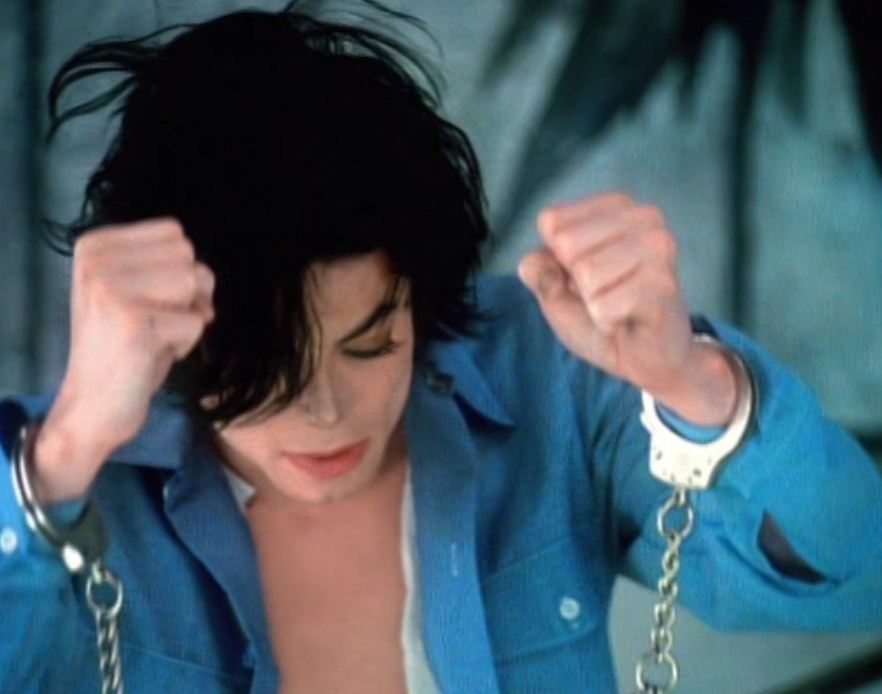DB Anderson | perceptive.kinja.com
As the Black Lives Matter movement grew in reaction to the lack of indictments in the deaths of Eric Garner and Michael Brown, Michael Jackson's 1995 song "They Don't Care About Us" was resurrected at the grass roots level in many cities including Ferguson, New York, and California.
"They Don't Care About Us" was denounced by The New York Times even before its release, and did not reach much of its intended audience because the controversy caused by the New York Times article would go on to overshadow the song itself. Radio stations were reluctant to play it and one of the short films Jackson created for the song was banned in the U.S.
Bernard Weinraub, husband of Sony Pictures Chief Amy Pascal, was the writer of the Times article.
"They Don't Care About Us" was Jackson's statement against abuse of power and the political corruption that enabled it. Two key events inspired the song:
- In 1992, five white police officers who stood trial in Los Angeles for the videotaped beating of Rodney King were found not guilty by a jury with no African American members. Then, as now, there were riots and protests about longstanding policies of racial profiling and systemic police brutality.
- The following year, Jackson, who had not been charged with any crime, was forced to undergo a humiliating 25 minute strip search by the same LAPD. The Santa Barbara District Attorney and police detectives arrived at Jackson's home in Los Olivos, California with a photographer who documented his private parts on film.
Black man, blackmail
Throw your brother in jail
All I wanna say is that
They don't really care about us
Bernard Weinraub's pre-release story accused Jackson of having "bigoted lyrics" in the song. He described the entire HIStory album as "profane, obscure, angry and filled with rage."
His piece touched off a firestorm of other negative media coverage. The criticism was disingenuous, as the lyrics were taken out of context and Jackson was very clear about his true intention. The critics were overwhelmingly white.
Many of Weinraub's email messages to Pascal were exposed in the Sony hack; one advised her to fire an executive which she promptly did; another stated outright that he had special access and influence with New York Times columnist Maureen Dowd.
Pascal was previously Vice President of Columbia Pictures, where Jackson, who wanted to star in films, had a motion picture contract that was never fulfilled. Later she became head of Sony Columbia Pictures. Jackson's recording contract was with Epic, a division of Sony.
Weinraub, who is now a playwright, was a respected New York Times reporter on the Hollywood beat until his relationship with Pascal created a conflict of interest that began to anger the subjects of his arti.... Weinraub admitted to as much in his farewell column at the New York Times.
Weinraub's cozy relationships in Hollywood included David Geffen. Geffen had worked closely with Jackson, convincing him to replace his key advisors with ones hand-picked by Geffen, according to Zack O. Greenburg's Michael Jackson, Inc.
When the controversy over "They Don't Care About Us" arose, Jackson asked Geffen for public support, but he would not go on record. Jackson's manager, Geffen's pick Sandy Gallin, refused to speak on television. He fired Gallin and never spoke to either of the men again.
Geffen refused to be interviewed about Jackson for Greenburg's book.
Jackson and Spike Lee made two separate short films for "They Don't Care About Us." "He was not having good relations [with Sony/Epic]...there was friction there," said Spike Lee in a recent interview with Iconic magazine.
The first version, recorded in Brazil, features the Afro-Brazilian drumming group Olodum. If you're familiar with the song, this is the version you've probably seen. Already in production at the time of the controversy, it uses sound effects to obscure the objectionable words.
But the "Prison" version is a tour de force; Jackson had even more to be angry about. Jackson and Lee chose to film in a Long Island jail, said Lee, because "a lot of people in prison shouldn't be there. A lot of people are there for a much longer time too. In American prisons, there are more brown and black people than white."
All Jackson's frustrations seem to be on display in this raw and angry performance. Behold:
Jackson would not win though - at least not then: the Prison version was banned from American television.
Jackson would later go on to have a public feud with executives at Sony Music, accusing them of racism. His protests were eyed skeptically by many at the time.
One particularly vicious 1995 Newsday review of this song read in part: "When Michael Jackson sings 'They Don't Care About Us' you've got to wonder who he thinks 'us' is."
The Black Lives Matter protestors don't wonder.
[Updated for clarity 11:16 PM 18 Dec 2014: Weinraub's article specifically mentioned that Jackson used the words "Jew" and "kike" in the song. Weinraub's article did not mention that Jackson also used the words "If Roosevelt was living, he wouldn't let this be" thus decontextualizing it. Nevertheless Jackson did not want to offend so he apologized and re-recorded swapping out those two words.]
